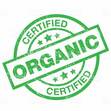|
What Does "Organic" Mean? By Pierre Mouchette | Bits-n-Pieces Organic produce and other elements are grown without synthetic pesticides, sewage sludge, synthetic fertilizers, genetically modified organisms, bioengineering, or ionizing radiation. With some exceptions, organic meat, eggs, and dairy products come from animals that are not given antibiotics or growth hormones. Although the term “natural” can be used on any product label without third-party verification, a product must be certified to be labeled as “organic.”
The focus is on farmers using renewable resources and imitating natural ecosystems to preserve and sustain the soil and water without damaging the environment. Processed organic foods are also held to careful standards to safeguard the integrity of the organic product and its ingredients. Some examples of organic farming practices include compost, manure, and crop rotation to keep the soil healthy naturally. Healthy soil facilitates the plant's resistance to disease and pests. A common phrase that embodies organic growing is ‘feed the soil, not the plant.’ Crops are typically grown according to the climate, and organic farmers often produce a variety of crops instead of one. While organic farming does not allow many dangerous chemicals, certain pesticides derived from natural sources are permitted in pmakingorganically grown food. Organic farming helps to thwart soil erosion and protects local wildlife, streams, and watersheds instead of conventional agriculture, harming local ecosystems with chemical fertilizers and pesticides. To participate in the National Organic Program (NOP) and before a product can be labeled “Organic,” a government-approved certifier must inspect the farm and facilities where the food is grown and processed to ensure the farmer follows all required rules to meet USDA organic standards. Companies that handle or process organic food before it gets to your local supermarket or restaurant must also be certified. In addition to the inspection, a farm, processor, or handler must submit an organic system plan outlining their operations. Inspectors verify that organic practices such as long-term soil management, buffering from neighboring conventional farms, and proper record-keeping are followed. Inspections include reviewing the farm, the facility's cleaning and pest control methods, transportation, and storage. Products imported from other countries but sold as “organic” in the USA have been certified by the USDA National Organic Program. As in the USA, facilities are inspected annually and are subject to the same rules and regulations that US producers and handlers are. It is important to note that organic farming promotes the humane treatment of animals. Organic animals have access to the outdoors, and their living conditions are inspected annually. The organic certifier assesses the number of animals per square foot and acre and determines if it is adequate for the animals. As with all organic operations, they are also subject to surprise inspections. There is a difference between organic and free-range animals as well. An animal is free-range if it has access to the outdoors. However, there is no third-party certification and no requirements regarding feeding, health care practices, hormones, and antibiotics as there are with USDA Organic certified. Organic Product Labeling:
0 Comments
Your comment will be posted after it is approved.
Leave a Reply. |
Archives
May 2024
|
